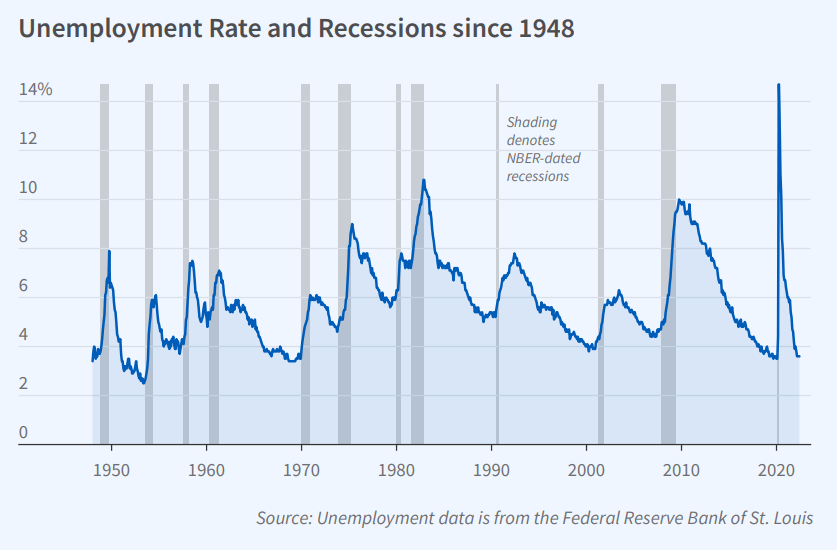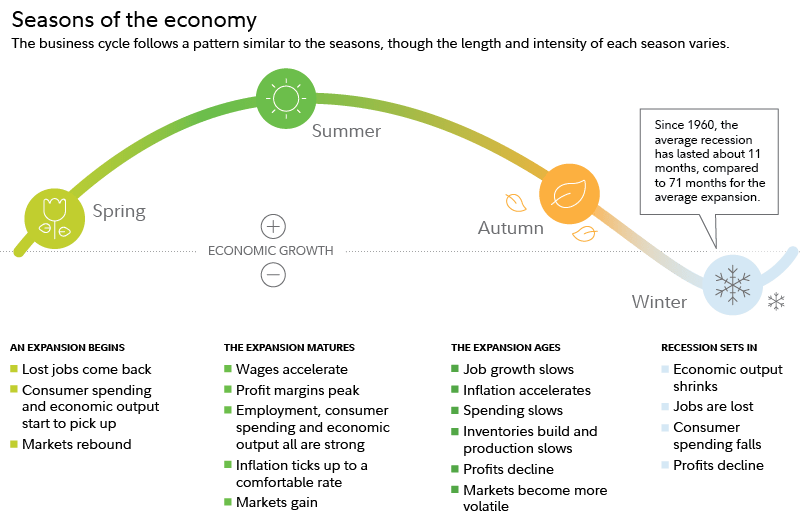
Image by Ashley Van Haeften via Flickr
It feels like everyone’s been talking about a recession for the past year and a half. Yet, have we really entered a recession? And if we have, what is the best strategy to develop during the worst economic period? In this blog post, we’ll cover the key points about a recession and reflect on the impact of past recessions—from the bookselling industry’s point of view. We’ll also try to understand what booksellers can do to stay ahead of their finances during the recession.
- What Is a Recession?
- How Long Does a Recession Last?
- Is a Recession in the U.S. a Reality?
- How Did Recessions Affect Bookselling in the Past?
- Will the Next Recession Hit Booksellers?
- How to Prepare for Recession?
- How to Earn During Recession as a Bookseller?
What Is a Recession?
In the U.S., the National Bureau of Economic Research (NBER) announces a recession’s start and end. According to the Bureau, a recession is “a significant decline in economic activity that is spread across the economy and that lasts more than a few months.” “It’s 1 of 4 phases in the endless economic circle of life, spanning from growth to peak to recession to trough (a.k.a. the bottom of the recession)—and back again,” according to Fidelity.
To put it simply, a recession is an extended period of economic decline.
How Long Does a Recession Last?
The U.S. has suffered 14 official recessions since the Great Depression:

From 1857 to Word War II, the average length of recessions was 17.5 months, with the Great Depression having lasted 43 months. Since 1945, recessions have lasted an average of 11 months, but the length of the next recession can never be predicted. The Great Recession of 2008–2009 lasted 18 months, while the COVID-19 recession (Pandemic Recession) lasted just 2 months (it began in February 2020 and ended in April 2020). Historically, recessions can occur on average about once every 5 years.
Is a Recession in the U.S. a Reality?
The NBER officially declares a start of a recession based on many factors, including gross domestic product (GDP) behavior, consumer income, and employment, as well as a range of other factors. In the U.S., we’ve already observed two consecutive quarters of negative GDP growth recently. Also, inflation has been going up for the past two years and reached a 9%-indicator in summer 2022—the highest since the 2000s (now around 7.7%).

Image source: Tradingeconomics
However, even with GDP’s negative growth and inflation, the NBER hasn’t yet officially declared a recession. It takes the bureau half of a year at the very least to determine if a recession has started, and it looks like this time, it’ll take longer. Judging by the previous cases, by the time the bureau has made an official announcement, a recession will be almost over.
According to the most recent case, the Pandemic Recession that (you already know this) lasted for 2 months in 2020 was officially declared as finished by NBER only on July 19, 2021 (15 months later).
Therefore, in reality, it does feel like we’ve been living in a period of recession for a while now. The cost of living is getting too high, and wages are getting lower—that’s why people have been talking about it for at least 17 months now.
How Did Recessions Affect Bookselling in the Past?
Now that we’ve covered the basics, let’s take a closer look at the bookselling industry.
The book industry and bookselling business have undergone great changes over the past 25 years. In 1996, we saw chain store and physical book domination on the market, with independent stores having only 18% of its share. The emergence of Amazon and the Great Recession of 2007–2009 have affected the overall bookselling market to a great extent.
However, when it comes to used book businesses and book reselling, it looks like past recessions didn’t hit them as badly as other industries.
Here are some examples from the period of the Great Recession. Publishers Weekly quoted an Aliblis representative in one of their articles in 2009, “Alibris had a great 2009. We saw double-digit growth and are still seeing growth overall in 2010.” The same article states that Half Price Books increased its revenue by nearly 8% (to $220 million) and opened a few new stores in 2009. Biblio’s average bookseller’s sales in 2009 were about flat to 2008, which wasn’t a bad indicator, all things considered. Small bookselling businesses also noticed that used books became high in demand and expanded their supply. Another fact about the period of the Great Recession is people started selling more books—to second-hand stores and online. Affected by the economic crisis to a different extent—from being urged to downsize, move, sell most of their valuables, etc.—people were selling the collections they had been collecting for years to stay afloat. So, we can say that the Great Recession has increased the used-book supply in general.
Also, according to a survey published in Bookfever, used bookselling businesses seemed to be less affected by the recession than other businesses. The survey was carried out among 48 booksellers from 20 states, Canada, and the UK; most of them had been in the industry for years. The survey concluded that the used book industry isn’t “recession-proof”; however, it seemed more secure than other sectors.
Another research on the impact of recessions on publishing industries concluded that “The available financial data of the recessions of 1990–91 and 2007–09 shows only a modest impact on the U.S. book publishing industry, certainly in comparison with the larger economy.”
Will the Next Recession Hit Booksellers?
So, what should booksellers expect from a recession this time? Are we actually heading to a recession, or is it already here? What’s the best strategy?
According to Digiday, which did research among publishers, they are looking to diversify their revenue streams in the next six months. It’s very likely that they are expecting an actual recession. Here’s how publishers responded to the Digiday’s survey:
- 67% agree somewhat or strongly that a recession will occur within the next six months.
- 65% agree somewhat or strongly that we will see a recession within the next 12 months.
- 4% disagree strongly that we’ll be in a recession in the next six months.
- 2% disagree strongly that a recession will happen in the next 12 months.
However, as we’ve mentioned above, it looks like we’ve already been living in a recession for a while, and things can get worse.
In 2020, print book sales increased by 8%, and in 2021, by 9%. However, it’s hardly likely that the same will happen in 2022. And it’s not happening. In May, print sales fell 6% from the comparable week in 2021. And according to Publishers Weekly, in 2022, we can see “Print unit sales falling 14.9% compared to the week ended November 6, 2021. Sales declined in all categories, including sales of adult fiction, which has been the best-performing segment this year.”
What about the used books market? We couldn’t find any similar figures for used book sales. However, according to the Persistence Market Research report, Second Hand Books Market Outlook (2022-2032), “The global second hand books market stands at a net worth of US$ 24.03 Bn in 2022.” and “The North America second hand books industry holds a market share of 27.8% in the global landscape.” The report also predicts the second hand books market “to rise at a CAGR of 6.6% from 2022 to 2032.“
If we get back to what we’ve discussed about the used book industry’s behavior during past recessions, it’s very probable that used book businesses will be affected in a much similar way—namely, not that much, with some booksellers even succeeding. Yet again, the report mentioned earlier was issued in March 2022, before many unprecedented events took place. Therefore, it’s really impossible to make any predictions—every recession is different.
How to Prepare for Recession?
While recessions are challenging and sometimes hurtful times, they’re part of the normal business cycle:

The key thing about any recession is knowing how to prepare and stay financially stable and even (if you’ve prepared well) to earn during a recession. So, here’s a to-do list for booksellers and bookselling businesses.
How to Earn During Recession as a Bookseller?
What can be and should be done is making use of all the lessons learned during previous recessions. So, what can work this time for individual booksellers and bookselling businesses that focus on second-hand books?
#1 Optimize Your Processes
If you’ve been thinking about ways to make the entire bookselling process more cost-effective, it’s high time to do it. By optimization, we mean everything from checking every step, from buying a used book (What kind? Where from? Max/min cost?) and listing it (Where?) to selling (Where?), packing (How?), and shipping it (How? Which carriers? Max/min cost?), etc. You should go all the way down your selling chain and try to optimize each process. If you aren’t using an inventory management system, you may consider utilizing one. If you plan on cutting a fair share of your inventory and you’re already using a bookselling software, you may reevaluate your expenses and terminate your subscription (for a while) for the sake of a less expensive method.
#2 Review Your Book Catalog
Review your book catalog: check the historical performance of specific books and categories. If you’ve been in the industry for a while, review sales performance during previous recessions. This will also give you an insight into the books that sold well. While books are not food or essentials, some of them will always be in demand.
Any investment consultant will tell you that in periods of recession, you should increase the share of gold and U.S. Treasuries or high-grade bonds in your portfolio and decrease the number of riskier assets like stocks and high-yield bonds. Similarly, in bookselling, you can focus on textbooks (seasonal but always in demand) and eliminate some less essential categories.
The same applies if you make most of your sales from rare collectibles. In a recession, it’s unlikely that even your returning customers will, well, return to buy an expensive rare title. So, you should rebalance and add a share of more essential titles to your catalog. In other words, you adjust your selling strategy and focus on what’s more profitable, leaving out the rest for a while.
#3 Get Rid of Excess Inventory
The next natural step is to get rid of what you’ve ruled out as potentially unprofitable while you’ve been reviewing your inventory. To do so, you can use your tried-and-true channels, and you can also leverage BookScouter’s Bulk Liquidation Tool. With it, you have the highest chances of getting rid of your excess inventory fast and profitably.
#4 Don’t Cut Down on Your Buyback
Go on with expanding your supply wisely. It may sound counterproductive at times like this, but if a recession hits full scale, the demand for books will definitely increase. Books, among other things, will become a very popular present. Just make sure you’ve revised your catalog before that.
#5 Go On (or Start) Reselling on Amazon
If you don’t use this selling channel, start doing it. If you do, don’t quit. Why? Recession or no recession, consumers will be purchasing goods online. According to the JungleScout Consumer Trends Report | Q3 2022, most consumers still favor Amazon before any other online platform (and tend to buy from it even if they first met the product on social media), and they’re also planning to increase their online spending this year (despite grim economic perspectives). So, if you are just a novice bookseller, leverage Amazon’s potential to get an extra cash channel during an economic downturn. And if you’ve been selling on Amazon for a while, continue doing it—with a few strategy corrections.
#6 Consider Acquisitions
Recessions provide opportunities for acquisitions (of other bookselling businesses). This option is more applicable for larger companies than individual booksellers; however, it’s helpful to remember such an option.
The Bottom Line
Though recessions are a natural part of the business cycle, and some of us have lived through several, they are always unpredictable and hurtful. While it’s impossible to say what impact the next recession will have, you can use your time now to prepare for it: as an individual—by securing your emergency savings and taking all the steps to safeguard yourself financially as much as possible; and as a bookseller—by developing a long-term strategy you can stick with even when expansion hits. It’s possible that a growth strategy where you’ll take action, stay competitive, invest, and increase your R&D budgets will work way better than cutting down, withdrawing, and panicking.
The good news is it’s not the first recession we’ve seen, and probably not the last.
The information in this blog post is given for general information only. It isn’t intended to be and doesn’t constitute financial advice or a strategic recommendation of any sort offered or endorsed by BookScouter.



